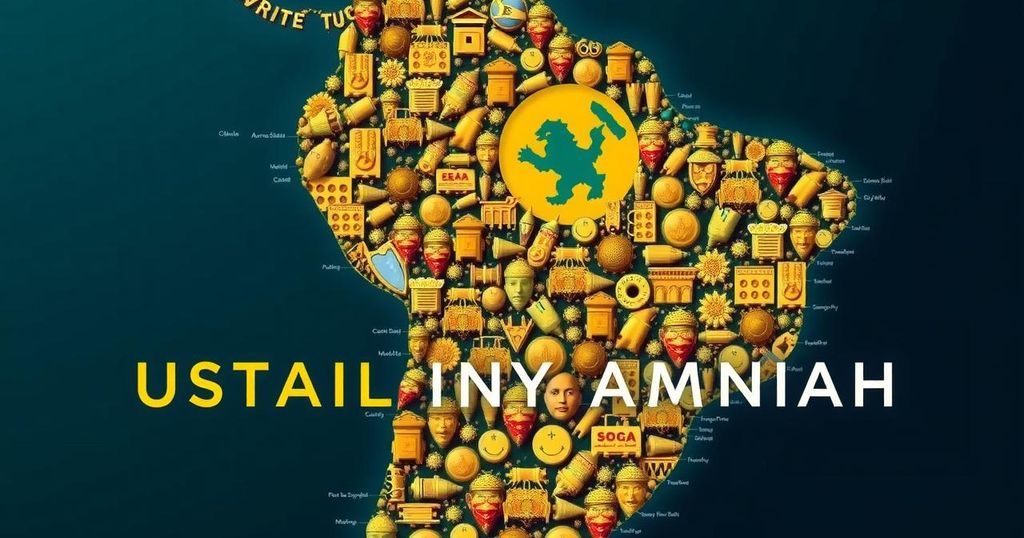Rise of Hezbollah in South America: Implications for Regional Security

Iran, utilizing Hezbollah, is increasing its illicit activities in South America, with notable operations in Bolivia, Brazil, Chile, Colombia, and Paraguay. Concerns regarding their presence, particularly in the Triple Border region, have prompted warnings from Argentine officials. The situation reflects a broader trend of organized crime intertwining with terrorism, necessitating enhanced regional cooperation to combat these threats.
Iran has reportedly expanded its influence in South America through the involvement of Hezbollah, its Lebanese proxy. Notably, countries such as Bolivia, Brazil, Chile, Colombia, and Paraguay have become strategic points for alleged illicit activities associated with Hezbollah. In a recent statement, Argentine Security Minister Patricia Bullrich raised concerns regarding Hezbollah’s presence in the Triple Border region, which encompasses parts of Paraguay, Brazil, and Argentina. Furthermore, evidence of Hezbollah activities was noted in Chile, where the Barakat family allegedly provides logistical and financial assistance to the group. Fabián Calle, a professor of International Relations at Argentina’s Austral University, highlighted that Hezbollah’s presence in Latin America dates back to the 1990s, capitalizing on Lebanese communities formed from the civil war era. High-profile political analyst Emanuele Ottolenghi confirmed Hezbollah’s documented operations in Chile and Bolivia, stating that these networks thrive on burgeoning drug trafficking in the region, which facilitates money laundering endeavors. Calle elaborated on the increasing complexity of Hezbollah’s activities, noting that recent intelligence reports have identified the expansion of criminal networks in Bolivia and Chile aligned with Hezbollah’s objectives, further solidifying Iran’s foothold in Latin America. As reported by IranWire, Iran views South America as a strategic area for projecting its revolutionary ideology, primarily due to its proximity to the United States. A recent report by the French publication Le Point raised alarming suspicions about Hezbollah’s potential operations in Bogotá, Colombia, where a cultural center serving as a mosque could serve as a cover for its influence. The report elaborated that illicit drug trafficking funds may be integral to Hezbollah’s operations. In a statement to Infobae, Paraguayan President Santiago Peña expressed optimism about decreased terrorist operations in the Triple Border region due to improved intelligence efforts. He cautioned, however, about the persistent risks posed by the interconnectedness of organized crime and terrorism. Ely Karmon, a counter-terrorism researcher, underscored that the survival and operational capacity of Hezbollah rely on the Shiite communities scattered worldwide, particularly in free trade zones within Latin America. Finally, Calle emphasized the urgent need for collaborative intelligence sharing among regional security agencies to counter the converging threats posed by drug trafficking and terrorist groups. He noted the significance of Argentina’s alert to Chile regarding money movements linked to Hezbollah as a pivotal step towards regional cooperation.
The presence of Hezbollah in South America is a significant issue linked to the broader geopolitical strategies undertaken by Iran. Since the 1990s, Hezbollah has utilized the existing Lebanese diaspora for operational expansion, taking advantage of weak state structures and rampant crime in certain regions. The implications of their growing networks are concerning not just for regional security, but for global counter-terrorism efforts, particularly regarding drug trafficking, money laundering, and potential terrorist activities.
In conclusion, Iran’s growing influence in South America through Hezbollah poses a multifaceted threat encompassing terrorism, organized crime, and potential destabilization of the region. The strategic cooperation among regional intelligence and security forces is essential for mitigating these risks. Continued vigilance and formal collaborations will be paramount to addressing the complex interplay between terrorism and organized crime that Hezbollah exploits.
Original Source: dialogo-americas.com








